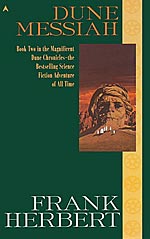
![]() verkisto
verkisto
7/26/2016
![]()
I think I've mentioned before that certain book titles can get a song lodged into my head for the duration of the time I read it. Dune Messiah is another of those books, with Metallica's "Leper Messiah" the song. I can't really complain, though; I find that to be one of the band's most distinctive songs, because it's different from the rest of their stuff. But this is a book blog, not a music blog, so let's focus on the story instead.
Following up Dune must have been a daunting task for Herbert. It won awards and accolades, was a critic's darling, and shook up a lot of what made science fiction science fiction. Most science fiction was about space travel and conquering new worlds; Dune was about obsessively cataloging a new world and creating a political story out of the usual tropes. Herbert himself said that the story was about looking more closely at those we call heroes and see them for the people they are. Dune Messiah takes that a step further by having readers look more closely at those we call gods.
To be clear, though, Paul has attained godhood, not just in the way he presents himself to the Fremen, but also in the way that his visions have become so clear that he's now foretelling the future. Like Isaac Asimov's Foundationers, Paul can now predict with incredible accuracy his own future, though once he picks a chosen path, he can't make changes to it. The story here is of Paul resisting his fate, embracing it, and then dealing with the fallout of it. He goes from god to martyr, at once exterminating the jihad that has so concerned him, while also ensuring the protection of his family and their rule for centuries to come.
The story moves more slowly than Dune. I at first thought the story might be a gentler one, but it's not really that at all; it's simply a more introspective story. Herbert had already established the setting of the story with Dune, so he was free to spend more time examining and deconstructing Paul as a god. It reminded me a lot of how Alan Moore deconstructs superheros with his best works, and I wonder how much Herbert was an influence on Moore.
My only issue with the book is how quickly certain conflicts are resolved. There was a scene near the end of the book where one character has to make a character shift, and the internal struggle lasts for one paragraph. Later, a key battle is defused within a page or two, when I would have expected more back-and-forth between the antagonists and protagonists before anyone emerged the victor. This isn't unique to Dune Messiah, though; Dune had a similar issue, especially with the final battle between Paul and Feyd-Rautha. And it's not a deal-breaker, by any means; I just would have liked for the conflict to play out more to increase the tension.
Dune Messiah is everything that Dune wasn't, while also being a clear successor to an excellent book. Minor quibbles aside, this is an impressive book.